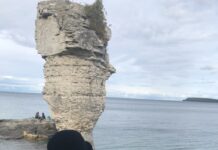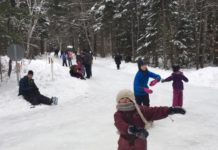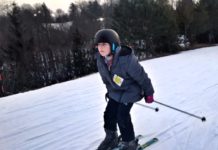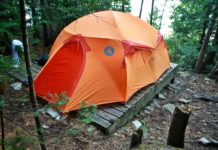By Hege Jakobsen Lepri
Probably the best moment I had this summer happened right in front of my house, rather an unexpected place for a rush of endorphins. My 17-year-old, who was so exhausted from last school year that she spent 3 days in her pyjamas, doing nothing but sleeping and watching bad television,finally got sick of my nagging and went out for a walk. When I went out to the front yard an hour later, I found her on the front steps, looking intently at a snail that was working its way across a leaf. She turned around with eyes that finally had got their sparkle back, saying isn‘t it wonderful, isn‘t it beautiful to see how it moves with its house on its back!? The reverence and awe in her reassured me that everything isn‘t lost, that her connection to nature is still stronger that her addiction to ‘Say Yes to the Dress“. My “mommy super-ego“ was placated: Fortunately a little screen time won‘t completely undo the values exchanged in 17 years of growing and developing together.

The biologist E.O. Wilson coined the term biophilia, referring to our need to affiliate with other species (bio = life; philia = love). In his book, carrying the same title, he states
I have argued in this book that we are human in good part because of the particular way we affiliate with other organisms. They are the matrix in which the human mind originated and is permanently rooted, and they offer the challenge and freedom innately sought.To the extent that each person can feel like a naturalist, the old excitement of the untrammeled world will be regained.I offer this as a formula of re-enchantment to invigorate poetry and myth: mysterious and little known organisms live within walking distance of where you sit.Splendor awaits in minute proportions.
Though memories from my semi-rural childhood, of classmates torturing animals, make me doubt parts of his thesis, I love how he underlines that mysterious organisms can be found near where you are. I‘m not a great camper; rather, I‘m one of those who always forgets something vital that inevitably will make the trip into an experience without adjectives (- and even that description comes because people are well-mannered).Sometimes I feel this makes me into a walking, talking oxymoron: An urban being trying to live sustainably without spending months in the Algonquin Park. Wilson‘s words save the faith I have in the integrity of my own project.
However, city-life (and I dare add suburban life as I know it) increasingly works against our biophilic needs by instead generating biophobia “Fear of Nature.” We teach our children by the way we react to nature‘s intrusion into our homes: Take that out. Don‘t touch. It might bite. Our fear of the natural world makes our homes fortresses against outside dangers; they become safe spaces filled with play-things to keep us busy and happy while were under siege from a world of risk. The consequences of this have been widely documented by statistics: outdoor play almost eradicated in some areas; increase in the number of over-weight and obese children, diabetes, hearth disease; increase in anxiety levels. If we go beyond the impact on children‘s health, the consequences on their world-view can have even more far-reaching effects on how they‘ll act collectively and politically as decision-making adults. How can you make sacrifices to protect our environment if you only know nature vicariously? How can we expect the next generation of adults to take action, when our, much less nature-deprived generation has done so little? How can they protect something they really don‘t know?
This week I learn’t about the production of the documentary PLAY AGAIN, which investigates the consequences of a childhood removed from nature.
PLAY AGAIN follows six teenagers who, like “the average American child‘, spend five to fifteen hours a day behind screens. This film unplugs the teens and brings them on their first wilderness adventure.
I‘m eager to see the film, hoping it won‘t resemble in any way a one of those reality shows of ‘brats being taught to survive in the wild‘ only to return to the same life they had 2 weeks later. I‘m hoping it will say something deeper about how reverence for, and worry about, nature is born, and how vital it is.
Though I am partially convinced by the Wilson‘s arguments about biophilia, I am equally convinced the mere existence of an instinctive bond between human beings and other living systems isn‘t in itself enough to make children love and care about nature. In my experience the bonding doesn‘t happen instantly. If you send your children out in the woods on their own for the first time after they‘ve been conditioned for years about the imminent danger “out there“, they‘ll most likely return more frightened than before. Fear is such a basic instinct in us, it certainly conquers any natural tendency towards biophilia.
As a (long) past exchange student, I keep using my exchange student experience as a bottomless source of parables about the human condition. A lot of my experience in my year abroad was about fear, and overcoming fear. You were fearful of different kinds of food, of dealing with social situations, of recognizing danger, of being hurt, very much like the fears of someone who is taken into the woods to experience nature for the first time. It would be fantastic if this fear melted away as soon as you were exposed to your new reality, but it is not so.Some of the fear will linger on, but as your connection to the new environment grows, at least the most irrational fears tend to dissipate, whether they‘re connected to life in a foreign country or to leaving the safe indoors.
I am convinced that parents need to make an effort to help their children discover nature, by guiding them there, teaching them, or simply being there with them. Biophilia by itself won‘t do it; we need to love what we want to promote, and with love of nature, the sacrifices to protect it will come more naturally.
I still remember my 17-year-old when she was 3 years old and we moved to Norway from Italy. She was used to being outdoors every day in city parks, but hated getting her hands dirty. This hang-up made excursions into the woods behind where we lived complicated, to say the least. It took more than a month, and several mudpies made with my adult hands no help from her side, for her to come around. Seeing her admire a snail almost 14 years later made me realize how important those mudpies were.
First published HegeinCanada
Hege Jakobsen Lepri lives in downtown Toronto with her Italian husband and two teenage daughters. She’s a sociologist-turned project manager- turned translator, a profession she landed in after moving too many times to keep my other career options open. She’s lived in Norway, Italy, the US before landing in Canada. Deeply concerned about the earth╒s future and trying to engage in the struggle for sustainability as much as possible, whether it is through blogging, activism, housekeeping or simply bringing up children. And she’s still wondering what to do when she grows up.
Visit her blog HegeinCanada






